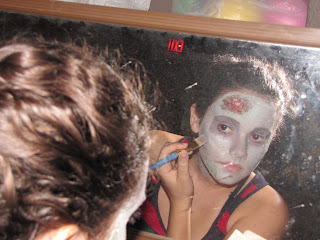“In
sooth, I know not why I am so sad; it wearies me, you say it wearies you; but
how I caught it, found it, or came by it, I am to learn.”
We
live in a sick society, divided by our wealths, politics, races. But we pretend
we live in a healthy society where anyone can prosper with enough gumption,
where bi-partisan politics will find the answers best suited to our nation as a
whole, and where racism has been legislated out of existence.
Depression
and hopelessness are on the rise, and suicides have increased by thirty percent
over just the last seven years. When one cannot reconcile reality with the
approved script, confusion, feelings of powerlessness, and depression result.
Antonio, aka the merchant of Venice, is an example of this existential malaise.
The
play opens with a discussion of the reasons Antonio is sad, but he has no
explanation. He is wealthy, his business is robust, and he has friends who are
concerned about him. He rejects the idea that he is sad because he suffers from
unrequited love. In short, he says he doesn’t know why he is sad, he only knows
that he is.
He
is living in a place and time where Jews and Christians look upon each other
the way Muslims and Christians do today. Some folks are more vocal about their
feelings, but the culture at large is fraught with suspicion, fear, and hatred.
Although his business is thriving, his ventures are vulnerable. And it is
probable that he is a closeted homosexual.
His
actions suggest that he desires deeply to have a positive impact on the world,
to be a part of something larger than himself, and to contribute to the good.
He does this by borrowing a large sum of money to stake one of his young
friends toward his desired future. He borrows the money from a local Jewish
money lender. After the deal is done, Antonio’s spirits rise a bit.
Unfortunately,
Antonio has long been a ruthless competitor of the Jew from whom he borrows – a
man who knows Antonio to be an anti-Semite. Antonio calls Shylock: the Jew, a
dog, the devil, an evil soul, and a liar.
Once
the deal is done, Antonio, the play’s title
character, disappears for a long time. Shakespeare is dealing with the
sub-plot, true, but the absence of Antonio in the action allows us to see the
society in which he lives. Shylock and another of his Jewish friends are
bullied by some local Christian toughs. A young Christian man named Lorenzo
elopes with Shylock’s daughter and converts her to Christianity. Several
wealthy suitors try for the hand of a woman “richly left,” causing us (and her)
to wonder if they are interested more in her or in her wealth. The woman in
question, Portia, has little control over her own destiny and is a kind of
prisoner to her dead father’s will. A poor, ignorant servant boy happily
applies for and takes a new position with slightly better wages. In short, the
characters and society surrounding Antonio value wealth over love, Christianity
as the correct religion, and male dominance over women. Everyone struggles to
make sense of the world while ignoring the fundamental disconnect in their
lives.
When
Antonio returns to the story, he is being arrested because Shylock has brought
a civil suit against him for breach of contract. A believer in the rule of law,
Antonio goes willingly with the officer and is next seen in court where he
protests very little about his fate. One wonders if Antonio is attempting
suicide by breach of contract. The malaise has not lifted, and Antonio treads
water in the same endless sea of confusion. He is ready to die.
When
he is saved and order is restored (the Christians strip Shylock of his wealth,
business, and religion and call it mercy), Antonio is returned to his mental
state of the play’s beginning. He does not rejoice at being saved. He quietly
accepts his fate and returns his focus to helping his young friend succeed.
Antonio
is an example of what many people feel these days. His education does not save
him. His wealth does not save him. His faith does not save him. His friends
cannot save him from his depression even if they can save his life. In the end,
he stands aside and watches the subplot characters fuck each other over in a Lucy-like
prank, and I believe his despair deepens. I believe he looks upon the world in
which he lives and weeps inwardly. As a racist himself, he is no better than
anyone else in the play unless it might be said that the sadness of his soul
lifts him above the common sway.
That’s
what it’s like to live in a world gone crazy. Our production features a woman in the title role as Antonia.









